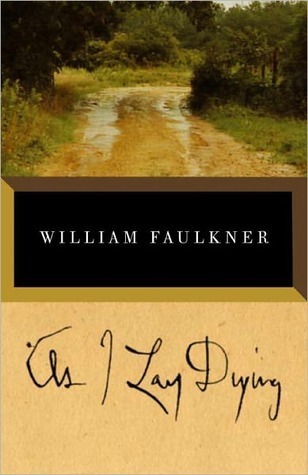Book #42
As I Lay Dying by Willian Faulkner
Faulkner's harrowing account of the Bundren family's odyssey across the Mississippi countryside to bury Addie, their wife and mother. Told in turns by each of the family members—including Addie herself—the novel ranges in mood from dark comedy to the deepest pathos.
I’ve never read Faulkner before now, and I’m really kicking myself about it, because As I Lay Dying is a complete masterpiece.
Faulkner employs multiple voice narrative to help us get under the skin of each of the Bundrens, and various other characters. An open mind is essential, however, as this is no stream of consciousness walk in the park; nor is it in any way linear, with the characters moving from past to present, to what ifs, to maybes. One character would explain what was going on, only for the next to go back and explain it again on their own terms, and from their own perspective. Their narratives confused the life out of me until I settled into their utterly weird voices, and only then was I truly able to enjoy what they were telling me.
Faulkner employs multiple voice narrative to help us get under the skin of each of the Bundrens, and various other characters. An open mind is essential, however, as this is no stream of consciousness walk in the park; nor is it in any way linear, with the characters moving from past to present, to what ifs, to maybes. One character would explain what was going on, only for the next to go back and explain it again on their own terms, and from their own perspective. Their narratives confused the life out of me until I settled into their utterly weird voices, and only then was I truly able to enjoy what they were telling me.
There are various instances in the plot where everyone knew exactly what was going on, expect me, the humble reader. Initially, I felt idiotic, as though I’d missed something, but after this happened a few times, I realised Faulkner likes to throw us into the delirium before offering his explanations for it. This lends a real sense of pandemonium and bewilderment to the reader, and ties in nicely to the character narratives.
The Bundrens could be the very people who inspired the phrase “dysfunctional family”. Each of them isolated from each other both physically and emotionally, the only thing connecting them is the rotting corpse in the back of the wagon. They respond differently to their mother’s death, some with physical or emotional distractions, some with physical or emotion reactions. The variance in each of them is gorgeous, as is seeing them attempt to achieve their purpose with no form of honest communication or understanding of one another.
In summary, this novel could be explained away as a comedy. Reading it, however, is anything but; Faulkner’s atmospheric melancholy and sense of hopelessness bleeds through the pages, and inadvertently shows us the turmoils of poverty in the Deep South. It was wonderful.

